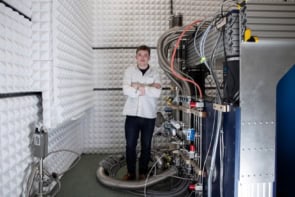James McKenzie looks back at the remarkable life of the late Sir Martin Wood, who was a pioneer in the commercialization of physics research

It all started in a garden shed in Northmoor Road, Oxford, in 1959. That was where Martin Wood and his wife Audrey set up a company to build superconducting magnets for use in scientific research. At the time, Wood was based in the Clarendon Laboratory at the University of Oxford, where the concept of a spin out was unheard of. But Oxford Instruments proved to be a staggering success and, in 1983, became the first Oxford spin out to be listed on the London Stock Exchange.
These days the company is a hugely profitable FTSE 250 business with global revenues of over £300m, most of which come from exports, and a market capitalization of £1.2bn. Historically best known for its magnetic resonance imaging (MRI) scanners, Oxford Instruments now builds, rents, sells and services a range of hi-tech tools across a wide range of applications. Its technology stretches from X-rays and plasma equipment to microscopy and nanoscience.
I got introduced to the company’s remarkable story by Jonathan Flint, a former president of the Institute of Physics who was chief executive of Oxford Instruments from 2005 until 2016. As he explained, Wood set up the firm while working as a senior research officer at the Clarendon lab (a position he held from 1955 to 1969). His job was to manage its high-magnetic-field facility, designing and making powerful electromagnets that his boss – the Hungarian émigré scientist Nicholas Kurti – and his colleagues wanted for their research.
Martin Wood’s electromagnets proved so popular that when students from the Clarendon left for other jobs, they would ask him to make magnets for their new labs
Wood found he could generate these electromagnets using superconducting materials operating at a few degrees above absolute zero. Indeed, they proved so popular that when students from the Clarendon left for other jobs, they would ask Wood to make magnets for their new labs. Realising this was an opportunity to go into business, he sought approval from Kurti, who fortunately gave his full backing to what was then regarded as a most unusual request.
Wood built the magnets in his garden shed, which years later moved to the grounds of his family’s new home in recognition of the pivotal role it played in the development of superconducting magnets. As noted in his obituary in the Guardian, starting a company was the realization of Wood’s long-held ambition to create a productive and rewarding working environment. Audrey covered the finance and people issues, while Martin concentrated on technical and customer aspects.
A different culture
As well as being pioneers in the commercialization of university research, Audrey and Martin Wood always adopted an unusually positive culture toward staff. It was a pioneering approach that many ex-Oxford Instruments people speak fondly of and carry forward in their professional lives. Flint himself told me how he was invited to the Woods’ home during the selection process for the top job at Oxford Instruments.
“The visit was completely unlike any executive selection I had been involved in before,” Flint recalls. “Martin and I had a wide-ranging discussion on topics from the natural world to the potential of the then embryonic field of quantum computing. By the end of the afternoon, I was enthralled by Martin as a person and quite forgot I was in a job interview.”
Claire Flint, a former group human-resources director at Oxford Instruments, has similarly positive recollections. “Sir Martin instinctively understood that engaging the whole workforce in shared endeavour was right for the people and the organization,” she says. “More than 50 years on, his ethos is still a core part of what makes the company commercially successful and a special place to be a part of.”
Oxford Instruments grew rapidly, becoming a global leader in designing and making superconducting magnets. Its products made it possible for people like the Nottingham University physicist (and future Nobel laureate) Peter Mansfield to image the body using MRI. Indeed, the company supplied superconducting magnets designed by Wood for the first whole-body MRI scanners in 1980.
As time went by, Martin and Audrey moved into philanthropy, supporting business start-ups, scientific innovation, young people and the natural environment
As time went by, Martin and Audrey moved into philanthropy, supporting business start-ups, scientific innovation, young people and the natural environment. Wood, however, kept a substantial shareholding in Oxford Instruments even after delegating the day-to-day running of the organization. And although the business was a financial success, it was always the science and people of Oxford Instruments that really interested him.
Nurturing minds
Aware of the challenges facing fledgling companies, in 1985 the Woods set up the Oxford Trust, buying an old builders’ yard in the city the following year. It became home to the Science and Technology Enterprise Project – the first innovation centre in the region and a catalyst for Oxfordshire’s now-flourishing ecosystem of innovation incubators and science parks. These days the trust runs the Wood Centre for Innovation and the Oxford Centre for Innovation, which provides work space for 40 science and tech start-ups.
Speaking shortly after Sir Martin’s death on 23 November 2021, Steve Burgess – chief executive of the Oxford Trust – paid tribute to Wood’s passion for innovation and physics, which saw him support new tech firms at a time when no-one else had the vision to do this. “With Audrey always at his side, the duo made an incredible impact on today’s entrepreneurial landscape and science education.”
Over the last 30 years, the Oxford Trust has supported hundreds of businesses including Quantum Dice, which last year won a business start-up award from the Institute of Physics. Sir Martin proved not only that high-technology start-ups can thrive in the UK, but also that they can grow into billion-pound businesses – without losing touch with the people and the science that made them possible.



